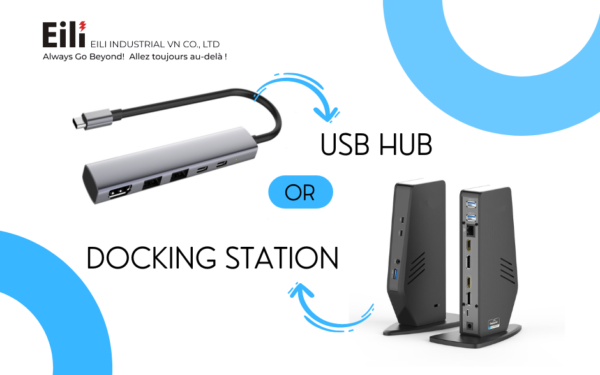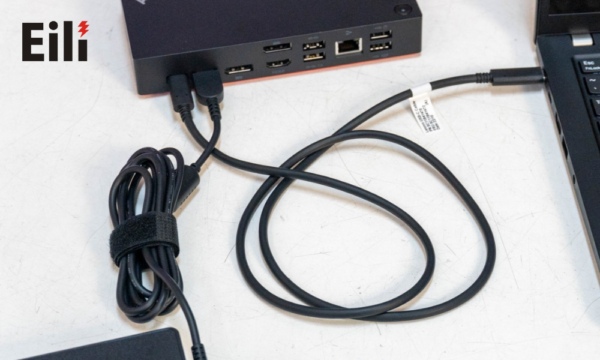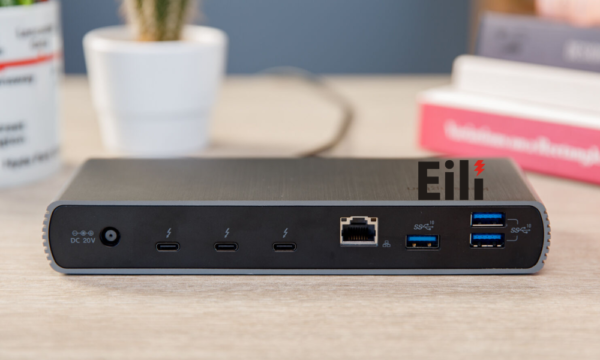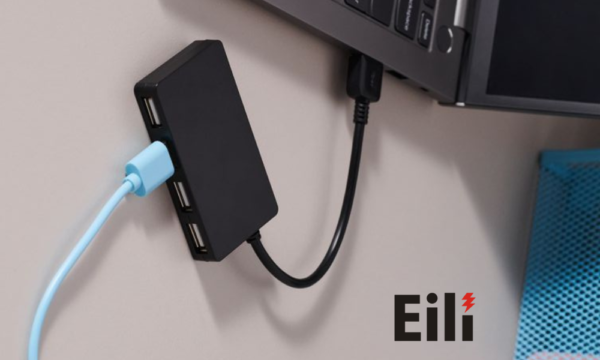USB Docking Station, USB Hubs
USB Hub Vs. Docking Station: 5 Differences You Need To Know
When you’re setting up your workstation, choosing between a USB hub and a docking station can be a bit of a puzzle. Both devices expand connectivity options, but they serve different purposes. Let’s dive into the top differences you need to know with Eili!

What is a USB Hub?
A USB hub is a small device designed to expand the number of USB ports available on a computer. It typically connects to your laptop or desktop via a single USB port, allowing you to plug in multiple devices at once.
Key Features
USB hubs are lightweight and highly portable. They usually have multiple USB-A or USB-C ports, which can be used to connect peripherals like mice, keyboards, external hard drives, and other devices. Some are powered, while others draw power from the connected computer.
Common Uses
USB hubs are ideal for users who need to connect several low-power devices simultaneously. They are perfect for travelers and those who work on the go, allowing easy connectivity to essential peripherals without carrying multiple cables.
What is a Docking Station?
A docking station is a more advanced device that connects a laptop or desktop to various peripherals and external monitors. It’s like a central hub for your workstation, providing not only USB connectivity but also additional ports such as HDMI, Ethernet, and more.
Key Features
Docking stations offer a wide range of ports, including video outputs, Ethernet ports, and audio jacks, in addition to USB ports. Many also support power delivery, charging your laptop while you work. It’s generally larger and more stationary than the hubs, designed for use in a fixed location like a home or office.
Common Uses
Docking stations are ideal for users who need a full desktop experience with their laptop. They’re perfect for connecting multiple monitors, network cables, and high-powered devices, making them a great choice for home offices or corporate environments.

Difference #1: Number of Ports
The most obvious difference between a USB hub and a docking station is the number of ports. USB hubs typically have 3-7 ports, primarily USB-A or USB-C. In contrast, docking stations often offer a wider range of ports, including HDMI, DisplayPort, Ethernet, audio jacks, and more, in addition to USB ports.
Difference #2: Functionality
While USB hubs are great for expanding USB connectivity, they don’t offer the same range of functions as docking stations. Docking stations provide a comprehensive solution for turning your laptop into a desktop-like setup, supporting multiple monitors, wired internet, and additional peripherals.
Difference #3: Port Types

USB hubs usually offer only USB ports, which may limit connectivity for certain devices. Docking stations, however, provide a mix of port types (USB, HDMI, Ethernet, etc.), allowing you to connect various devices, including monitors, printers, and other peripherals.
Difference #4: Power Delivery
Some USB hubs are powered, meaning they have their own power source, but they usually cannot charge a laptop. Docking stations, on the other hand, often support power delivery, which means they can charge your laptop and power all connected peripherals simultaneously.
Difference #5: Portability
Hubs are designed for portability. They’re small, lightweight, and easy to carry around, making them perfect for on-the-go use. Docking stations are larger and designed to remain in one place, providing a stable, desktop-like setup.
Which One Should You Choose?
Choose a USB Hub If…
- You need a portable solution for connecting multiple USB devices.
- You frequently travel or work in different locations.
- You don’t need to connect multiple monitors or high-power devices.
Visit Eili’s USB Hub right here!

Choose a Docking Station If…
- You need a full desktop experience with multiple monitors.
- You work from a fixed location like a home or office.
- You require Ethernet connectivity, multiple device charging, or video outputs.
Visit Eili’s Docking Station right here!
Conclusion
In the battle of USB hub vs. docking station, the right choice depends on your specific requirements. If you need flexibility and portability, a USB hub is your best bet. However, if you want a complete workstation setup with all the bells and whistles, a docking station is the way to go. Evaluate your needs and pick the device that best enhances your productivity!
Related Articles:
- Comparing USB-C Docking Stations: The Best Choices for MacBook and Dell Laptops
- The Benefits of Powered USB-C Hubs: Why You Need a Hub with Power for Your Laptop
- Guide to Repairing USB Multiport Hubs for Samsung DeX: From Basics to Advanced
Connect with Us:


